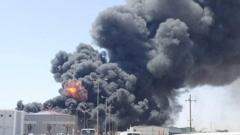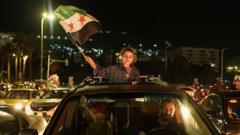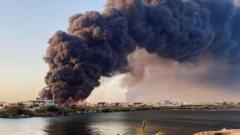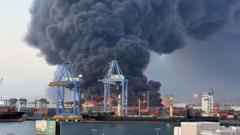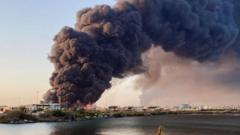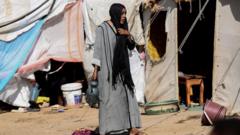In a notable display of political ambition, the Rapid Support Forces of Sudan held a meeting in Kenya to outline plans for a breakaway government, amidst ongoing military challenges and international scrutiny regarding human rights violations.
Rapid Support Forces of Sudan Moves Toward Breakaway Governance

Rapid Support Forces of Sudan Moves Toward Breakaway Governance
Amid ongoing civil strife and accusations of atrocities, the Rapid Support Forces (R.S.F.) convened a significant political event in Nairobi as they aim to establish an independent government.
There's been rising concern surrounding the situation in Sudan, particularly with the paramilitary group, the Rapid Support Forces (R.S.F.), asserting its influence. On Tuesday, Abdul Rahim Dagalo, the deputy leader of the R.S.F. facing U.S. sanctions, attracted attention at a large political gathering in Nairobi, Kenya. The event, reminiscent of political rallies, featured enthusiastic supporters but was devoid of significant outcomes, such as the signing of a crucial charter aimed at establishing governance in regions under R.S.F. command.
Despite the optimism among supporters, the absence of a signed agreement highlights the challenges the group faces in forging a cohesive power structure while concurrently contending with military setbacks against Sudan's national army, which has recently secured strategic victories in Khartoum and central Sudan.
The charismatic Dagalo was flanked by Abdel Aziz al-Hilu, the leader of another faction, indicating the complexities of alliances amid Sudan's civil war. With the backdrop of U.S. allegations of genocide against the R.S.F. and ongoing shifts in regional alliances, the formal gathering in Nairobi symbolized the R.S.F.’s struggle for legitimacy and control. As they continue to assert their claim over significant territories amidst persistent accusations and rising humanitarian crises, the international community remains watchful, questioning the implications for Sudan's turbulent future.
Despite the optimism among supporters, the absence of a signed agreement highlights the challenges the group faces in forging a cohesive power structure while concurrently contending with military setbacks against Sudan's national army, which has recently secured strategic victories in Khartoum and central Sudan.
The charismatic Dagalo was flanked by Abdel Aziz al-Hilu, the leader of another faction, indicating the complexities of alliances amid Sudan's civil war. With the backdrop of U.S. allegations of genocide against the R.S.F. and ongoing shifts in regional alliances, the formal gathering in Nairobi symbolized the R.S.F.’s struggle for legitimacy and control. As they continue to assert their claim over significant territories amidst persistent accusations and rising humanitarian crises, the international community remains watchful, questioning the implications for Sudan's turbulent future.


